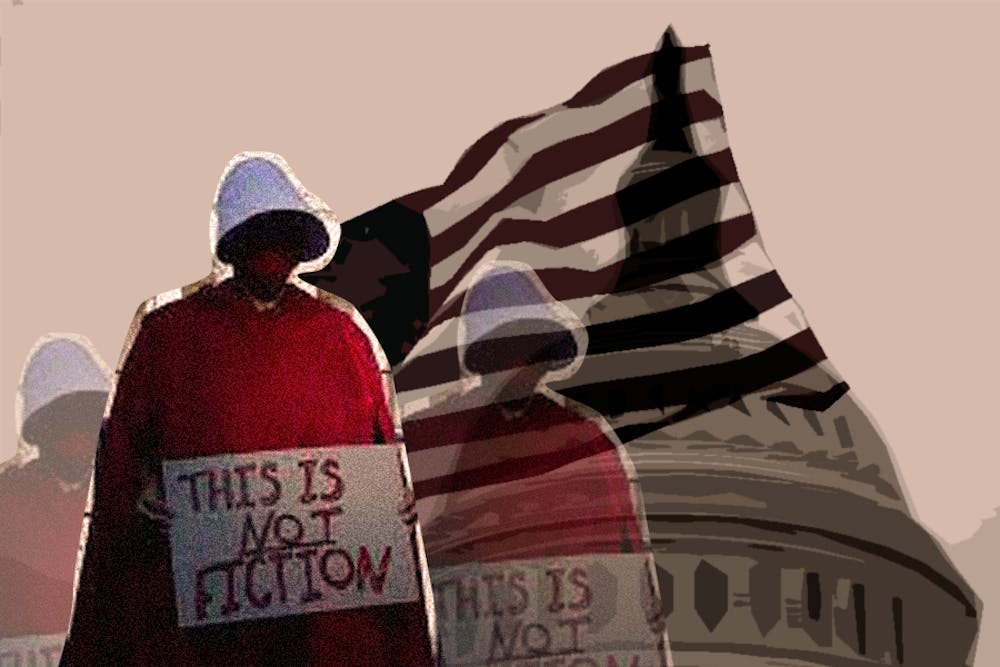When the first season of Hulu’s The Handmaid’s Tale premiered in the spring of 2017 to critical acclaim, pundits, critics, and journalists interpreted this dystopian tale through a frighteningly current lens. The show, based on Margaret Atwood’s 1985 novel of the same name, follows June Osborne as she is forced into childbearing labor by an America consumed by religious extremism. Premiering a few weeks after President Donald Trump’s inauguration, the show was backdropped by Trump’s presidency. The show’s villains were often compared to corrupt members of Trump’s cabinet, and even the show’s lead actress, Elisabeth Moss, and showrunner Bruce Miller were vocal on their belief that The Handmaid’s Tale was crucial to resisting the current political moment. The show quickly found its cultural niche as a narrative of feminist resistance. Yet even as much as it abhorred the Trump presidency, the show heavily leaned on the Trump administration and particularly its hard line on abortion for inspiration and relevance.
The Handmaid’s Tale allowed us insight into how America was reacting to a president accused of assault in office and how a conservative president was reigniting the debate over abortion rights. Often during Trump’s presidency, actors on The Handmaid’s Tale would comment on abortion rights and current laws; it also became commonplace for women to protest outside government buildings in the red and white costumes the titular characters wore.
When Trump left office, it became clear that The Handmaid’s Tale never really developed an identity with its audience outside of artistic resistance to an unpopular presidency. The show was critically acclaimed in its first two seasons, but less so in its third and fourth. Rotten Tomatoes called the show “spinning its wheels,” and The Hollywood Reporter called it “frustratingly repetitive” in its later seasons. Where its first season was chock–full of provocative storylines, the most recent seasons have been stuck in cycles of trauma with its main character. The fourth season, the first to premiere with Trump out of office, has an especially glacial pace, which continued into its fifth season, which premiered this September. If The Handmaid’s Tale is no longer resisting a political movement, then what is its point?
When The Handmaid’s Tale first premiered, it filmed its female characters with an empathetic eye and deeply considered their interiority; the show featured stark and unforgiving dystopian landscapes and had the gleam of introducing a classic novel to a new generation. The last season has backed away from June’s psychology and now focuses entirely on her bloody revenge missions, showing us spectacle instead of substance.
Season five begins hours after the finale of season four, where June has just murdered the man who abused her throughout the first season. Her friends and family are scared of her, the country she fled to as a refugee doesn’t trust her, and the widow of the man she killed, Serena, wants her dead. This new season follows the violent clashing of June and Serena, as they both seek revenge on the other for destroying each other's lives.
Unfortunately, this story doesn’t work. The Handmaid’s Tale has lost sight of what made it a quality show. Sure, the violence was a talking point, but it wasn’t the focus in the earlier seasons. The repressed humanity of its characters and its suffocating atmosphere of constant surveillance were the original reasons to tune in. The June we meet in the first season is not a successful rebel. She’s an unreliable narrator, not an active decision–maker, and certainly not the superhuman she is presented as in the fifth season; it’s almost as if she’s auditioning for The Avengers this fifth season, with her Black Widow–equse killing spree and new emotionless facade. As this new season heaps pain and suffering onto her, everything that made June an excellent character has nearly disappeared. Moss continues to give blood, sweat, and tears to this role, but sadly she can’t stop June from becoming completely boring.
In the fifth season’s premiere, there is a completely silent scene where June and her assassination posse show up to a random diner for breakfast still covered in fresh blood. As their server walks away, a furious June glares up into a close–up. She will glare into the camera like this many other times throughout the season. A show once revered for its portrayal of female rage has become a parody of itself.
The show’s insistence on following June and Serena’s personal animosity to its bitter end also robs the show of any way to be about the greater forces shaping this world. As the show makes its world bigger, ping–ponging between future America and future Canada, its emotional landscape has grown smaller. The earlier villains, like Bradley Whitford’s Commander Joseph Lawrence, felt monumental on a human scale, but when blown up to national proportions, they lose all power to scare the audience.
The Handmaid’s Tale should be more relevant than ever. With the overturning of Roe v. Wade, Trump did end up ushering in an America that The Handmaid’s Tale was foreshadowing. Yet, any ambitions to connect The Handmaid’s Tale to the modern political sphere have faded because this show has mostly severed its ties with today's politics. The show seemed built to meet this sociopolitical moment, but instead of rising to the current challenge, it’s sinking back into pure fantasy.
The Handmaid’s Tale has always wanted to tell a cautionary story—something that could absolutely happen if we aren’t careful enough to prevent patriarchal rot in our own society. However, its stumble into political relevance on its debut placed it on a pedestal it was never going to be able to maintain. Popularity may have extended the show’s run, but it also shaped the show into something unrecognizable. Dystopian shows are only scary when we can relate to their characters. When there are no recognizable people left on our screens, we inevitably stop watching. With a sixth and final season set to come out in the future, The Handmaid’s Tale’s fate seems sealed.

